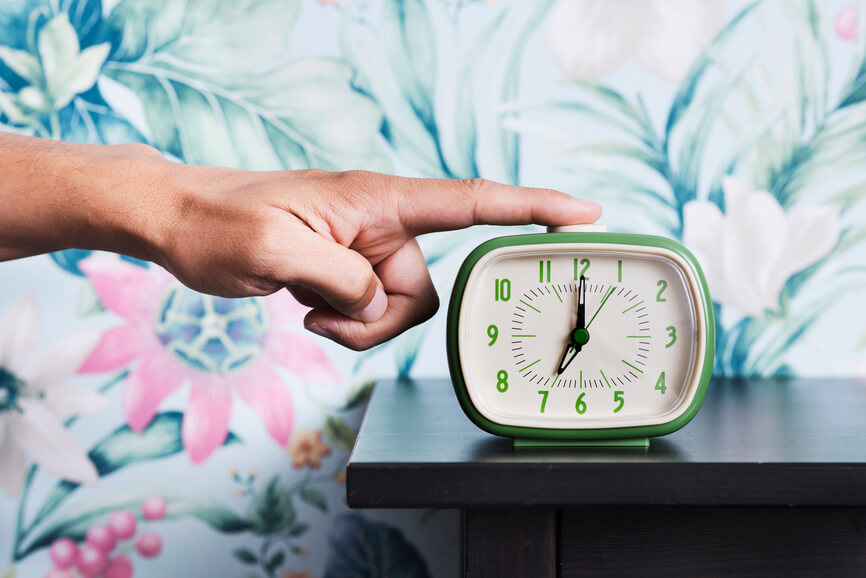

We’ve all been there. An all-nighter or a change in time zone, and boom. Your internal sleep clock is out of whack.
Now you’re sitting there tired, groggy, and wondering how to fix your sleep schedule. The good news is you can get back to a good night’s sleep by being deliberate about adjusting your routine and daily habits. But it’s going to require a commitment on your part.
Let’s discover ten ways to reset your sleep schedule and catch up on your zzz’s.
How does your sleep clock work?
Going to bed and waking up in the morning feels intuitive. That’s because your body likes to follow a consistent sleep pattern.
Every day, behind the scenes, our body’s circadian rhythm is dictating our 24-hour sleep-wake cycle. It’s the reason we feel active and alert during the day and sleepy at night.
Circadian rhythms are connected to a master clock located in a part of our brain called the hypothalamus. This area is very sensitive to light, which is why our circadian rhythms are mostly influenced by exposure to light.
The cycle of your circadian rhythm is regulated by your biological clock. Think of it as a natural timing device inside your body.
When your circadian rhythm is aligned, you experience a stable sleep-wake cycle. You function during the day and rest properly during the night. But what happens when our sleep clock goes out of sync?
A short-term disturbed sleep-wake cycle causes lower-quality sleep. So do long nighttime awakenings (segmented sleep). Not getting the rest you need can make you irritable, tired, forgetful, and unfocused.
In the long term, it can impact your mental health and mental fitness, or lead to serious health problems like heart disease.
Let’s explore what can turn your sleep clock upside down.
Why you might need to reset your sleep schedule
A well-balanced sleep schedule is important for your overall well-being.
Unfortunately, we all run into situations that challenge our circadian rhythm. Here are the main reasons you might need to press the reset button on your body clock.
1. Shift work
Any work schedule that falls outside a typical 8 am to 6 pm workday is called shift work. Nursing, firefighting, or police work are just some of the countless professions that require working hours that are not seen as a typical 9-5.
Shift work usually involves being awake on evenings and nights and catching up on sleep during the day.
Because of the changes in the light-dark cycle, shift work causes “circadian misalignment,” which can lead to shift work sleep disorder. This is especially true for people who work in health care and often change shifts without a proper “recovery sleep.”
2. Jetlag
Before the pandemic, taking intercontinental flights was a lot more common than it is now.
The downside of traveling between different time zones was, of course, the dreaded jet lag.

Jet lag is a temporary sleep problem that occurs when your body is out of sync with the day-night cycle of your new location.
Imagine you’re flying from New York to London, which is five hours ahead. By the time you arrive, it may be morning in London, but according to your body, you should still be sleeping.
3. All-nighters
All-nighters are tempting when you have a deadline, or you want to binge-watch your favorite show.
But staying up all night and catching up on sleep during the day completely disturbs your circadian rhythm. It can take weeks to reset your sleep schedule after pulling an all-nighter, according to Dr. David Greuner of NYC Surgical Associates.
We’ve all experienced a disturbance in our sleep schedule at one point or another. When this happens, it’s important to readjust our circadian rhythm as soon as possible. Falling into a pattern of poor sleeping habits affects the body and mind in the long term.
How to change your sleep schedule: 10 tips
The key to fixing your sleep schedule is to build healthy sleep habits. Here’s how to get your sleep schedule back on track.
1. Avoid big meals before bed
Eating a big meal before bed will impact the quality of your sleep. The last thing your body wants to do while you’re sleeping is work overtime to digest food.
Try eating at least two to three hours before your ideal bedtime. This will give your body enough time to digest.
And if you’re still craving a snack before bed, try healthy options like nuts, kiwis, or tart cherries. These foods are actually proven to help you sleep better.
2. Get your daily dose of exercise
Daily exercise helps you sleep better, especially when it’s done outdoors. According to Dr. Michelle Drerup, a sleep medicine psychologist, the natural light you get from exercising outside helps your body establish a good sleep-wake cycle.
If you can’t get outside, indoor and virtual workouts also help you sleep better. Physical activity tires you out and relieves anxiety and stress. This prevents tossing and turning and promotes more restorative sleep.
If you don’t have time to exercise during the day, you can still work out in the evening. Just make sure it’s at least one hour before bed.
3. Skip naps
After a late night or a long shift, having the urge to nap during the day is completely normal.
Even though a mid-afternoon nap is tempting, try to resist it if you can. Taking daytime naps can actually interfere with your sleep schedule. Instead of feeling restored, napping makes it difficult to go to bed at night.
When you feel tired during the day, opt for a 30-minute workout instead of a nap. It sounds counterintuitive, but exercise leaves you feeling refreshed, whereas napping makes you groggy.
4. Make gradual changes
The easiest way to restore your sleep schedule is by doing it in small increments.
Increase your time in bed by 15–30 minutes per week to regulate your sleep cycle. This kind of behavioral change is one of the ways doctors help people that suffer from insomnia.
5. Make space for calming activities throughout the day
Wellness trends and activities like yoga, meditation, or breathwork help reduce stress. According to the Sleep Foundation, reducing stress helps improve sleep quality.

Try meditating for just 15 minutes each day. Daily meditation strengthens your mental fitness, which helps you function better in day-to-day life. This includes getting better sleep each night and developing healthier habits.
6. Create a relaxing nighttime routine
It’s not always easy to transition from your daily routine straight to bed. Your body needs time to adjust and relax before it’s ready to sleep.
Avoid going on your phone or working right until your bedtime. Instead, create a relaxing bedtime routine by doing activities like:
- Taking a hot bath
- Making a cup of chamomile tea
- Reading a book
- Journaling
These activities ease your body’s transition into night mode when you have trouble falling asleep.
7. Get back to a consistent sleep routine
Having good sleep hygiene is all about developing healthy habits to ensure restful sleep. One such habit is keeping a consistent sleep schedule.
When your sleep clock is thrown off, getting back to a sleeping routine isn’t always easy. But it’s important. The more your sleep schedule fluctuates, the more health conditions you’re at risk of developing.
Set a bedtime reminder each night and stick to it as closely as possible. Similarly, set your alarm clock at the same time every morning. Eventually, your internal clock will adjust to your new sleep patterns.
8. Plan your exposure to light
By now, we’ve learned that light impacts our circadian rhythm. Use this knowledge to your advantage by being strategic about your exposure to light.

Before bedtime, dim the lights and avoid going on your phone or any other electronic devices.
Blue light from electronic devices suppresses the production of melatonin, a sleep-inducing hormone. Staying off your devices also helps you sleep better if you struggle with stress and anxiety.
In the morning, wake up to natural light by keeping your blinds open. The Sunlight Institute explains that sunlight acts like a trigger that can reset your circadian clock.
9. Watch your caffeine and alcohol intake
Having a glass or two of wine before bed may help you fall asleep faster. But drinking alcohol before bed disturbs your sleep cycle.
Similarly, avoid any caffeinated drinks after mid-day. Having a coffee in the afternoon can throw off your sleep as it takes several hours to wear off.
10. Talk to a sleep specialist
You can usually fix your sleep schedule by following good daily habits. However, if you’re experiencing continuous sleep problems, you should reach out to a specialist.
They can offer you proper treatment or diagnose a possible sleep disorder.
To pull or not to pull an all-nighter: do they work?
Pulling an all-nighter is a rather unorthodox way to reset your sleep schedule. Can this quick fix really work, or will it do more harm than good?
There’s some anecdotal evidence that all-nighters can get your sleep schedule back on track. If you’re trying to adjust to a different time zone, you may stay up at night to sync with your new sleep-wake cycle.
But pulling an all-nighter to fix your sleep schedule is, at best, a temporary fix — not a real solution. Besides giving you dark circles and puffy eyes, all-nighters can do serious harm to your well-being.
Fatigue, low energy, anxiety, and stress are just some of the side effects of a sleepless night.
The Sleep Foundation even advises against driving or making important decisions after an all-nighter. Sleep deprivation limits your brain’s cognitive functions, including concentration and mental performance.
You should especially avoid staying up all night before a workday.
How to fix your sleep schedule: get started today
Pulling an all-nighter is not how you fix your sleep schedule.
Learning how to reset your sleep schedule is all about developing good habits and a consistent routine. Make gradual changes and introduce healthy sleep habits in your life one day at a time.









You must be logged in to post a comment Login